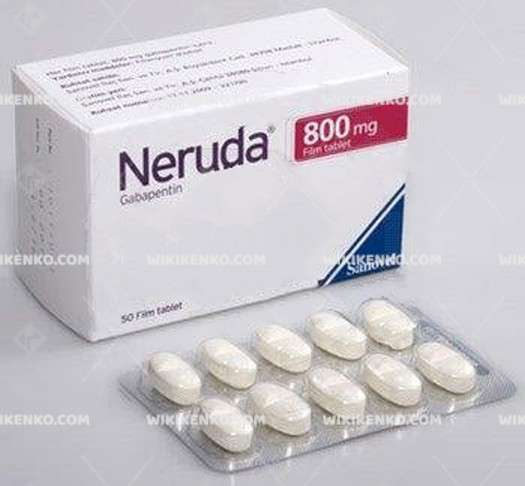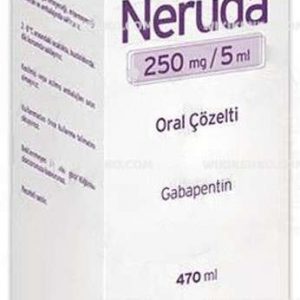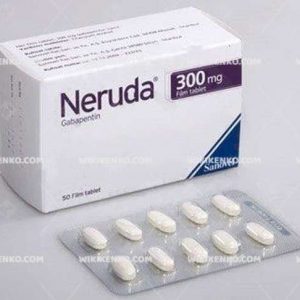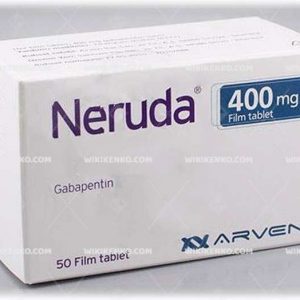Neruda Film Tablet 800 Mg
Neruda is a medication classified under the category of antiepileptic drugs, specifically formulated to address two primary medical concerns: epilepsy, characterized by seizures, and neuropathic pain originating from nerve tissue damage. Each film-coated tablet of Neruda is imbued with 800 mg of gabapentin, the active ingredient that imparts its therapeutic effects.
| Dosage form | |
|---|---|
| Pack size | |
| Potency | 800 Mg |
| Manufacturer | |
| Origin | |
| Generic Name (Ingredient) | Gabapentin 800 Mg |
Assuming your emergency circumstances for this product, visit Urgent Quotation page. Besides, for any pharmaceutical questions, please ask us in the comments section.
Description
Applications of Neruda
Epilepsy Management
Neruda plays a pivotal role in the treatment of various forms of epilepsy seizures, with a particular focus on those that initially impact specific brain regions, possibly spreading to adjacent areas. In cases where existing treatments prove insufficient, medical professionals may opt to prescribe Neruda for patients aged six and above. Unless otherwise specified by a healthcare provider, Neruda can be used in conjunction with current treatments. Moreover, it can serve as a standalone treatment for individuals aged 12 and older.
Neuropathic Pain Relief
Beyond its application in epilepsy management, Neruda emerges as an effective remedy for neuropathic pain stemming from nerve tissue damage. The sensation of this pain manifests in diverse forms, ranging from sensations of heat, burning, throbbing, and palpitations to descriptions as vivid as feeling like being stabbed or experiencing cramping, tingling, numbness, pricking, or freezing.
Precautions
Allergic Sensitivity
Individuals with an allergy to gabapentin or any component present in Neruda should abstain from its use. Additionally, those with newly onset acute pancreatitis, characterized by inflammation of the pancreas, should avoid this medication.
Caution for Kidney Health
For patients with kidney issues, a more cautious approach to Neruda usage is advisable. In such instances, healthcare providers may prescribe adjusted dosages to mitigate potential complications. Patients undergoing blood dialysis (hemodialysis) should promptly notify their doctors if they experience muscle pain and/or weakness. Persistent complaints of stomach pain, nausea, recurrent vomiting, or a general sense of sickness warrant immediate medical consultation, as these could signify the onset of acute or hemorrhagic pancreatitis.
Ingredients
The active ingredient in each Neruda Film Tablet 800 mg is, unsurprisingly, 800 mg of gabapentin. This therapeutic core is complemented by a selection of auxiliary ingredients, including copovidone, poloxamer 407, corn starch, magnesium stearate, hydroxypropyl methylcellulose, polyethylene glycol 400, polyethylene glycol 6000, talc, and titanium dioxide (E171).
Ingredients
| Component | Quantity |
|---|---|
| Gabapentin (Active Ingredient) | 800 mg |
| Copovidone | – |
| Poloxamer 407 | – |
| Corn Starch | – |
| Magnesium Stearate | – |
| Hydroxypropyl Methylcellulose | – |
| Polyethylene Glycol 400 | – |
| Polyethylene Glycol 6000 | – |
| Talc | – |
| Titanium Dioxide (E171) | – |
Side Effects
Employing Neruda, like other antiepileptic drugs, necessitates careful medical supervision. To mitigate potential side effects, treatment should be gradually tapered off. Common side effects associated with Neruda encompass sensations of drowsiness, fatigue, dizziness, compromised coordination, double vision, and dry mouth.
It is vital to note that the catalog of side effects mentioned here is not exhaustive. Should you encounter any unusual symptoms while utilizing Neruda, it is imperative to promptly seek guidance from a healthcare professional. They can furnish you with the most current and comprehensive information aligned with your specific health profile and concurrent medications.
Dosage
Neruda is administered orally, with the dosage meticulously tailored to each patient by their attending physician. The patient’s capacity to tolerate the medication and their response to it significantly influence the determined dose. Achieving the desired dosage often entails a gradual titration, a process characterized by a measured increase in dosage over time. For long-term treatments, clinical trials have demonstrated that doses of up to 4800 mg/day have been well tolerated.
Timing
An essential consideration when taking Neruda is the timing in relation to magnesium or aluminum-containing antacids. To optimize gabapentin bioavailability, it is advisable to consume Neruda at least two hours following antacid administration.
| Dosage | Administration |
|---|---|
| Minimum Dosage | Determined by the physician |
| Titration Schedule | Gradual titration as prescribed |
| Maximum Dosage | Up to 4800 mg/day in clinical trials |
Storage
While specific storage recommendations for Neruda Film Tablet 800 Mg may elude us from Turkish sources, it is always prudent to solicit guidance from a healthcare professional regarding medication storage. Their insights will align with your specific health conditions and any other medications you might be using.
In Conclusion
Neruda Film Tablet 800 Mg encapsulates the potential to alleviate epilepsy and neuropathic pain, offering a ray of hope for those grappling with these conditions. However, its judicious use, adherence to prescribed dosages, and vigilant monitoring for side effects are paramount. Prioritize your health by engaging healthcare professionals for informed decisions customized to your unique health circumstances
Use the form below to report an error
Please answer the questions as thoroughly and accurately as possible. Your answers will help us better understand what kind of mistakes happen, why and where they happen, and in the end the purpose is to build a better archive to guide researchers and professionals around the world.
The information on this page is not intended to be a substitute for professional medical advice, diagnosis, or treatment. always seek the advice for your physician or another qualified health provider with any questions you may have regarding a medical condition. Always remember to
- Ask your own doctor for medical advice.
- Names, brands, and dosage may differ between countries.
- When not feeling well, or experiencing side effects always contact your own doctor.
Cyberchondria
The truth is that when we’re sick, or worried about getting sick, the internet won’t help.
According to Wikipedia, cyberchondria is a mental disorder consisting in the desire to independently make a diagnosis based on the symptoms of diseases described on Internet sites.
Why you can't look for symptoms on the Internet
If diagnoses could be made simply from a textbook or an article on a website, we would all be doctors and treat ourselves. Nothing can replace the experience and knowledge of specially trained people. As in any field, in medicine there are unscrupulous specialists, differences of opinion, inaccurate diagnoses and incorrect test results.






Reviews
There are no reviews yet.